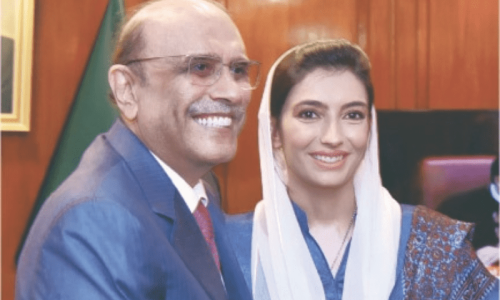ISLAMABAD: A Supreme Court judge said on Friday that the apex court realigned its direction in 2014 after learning from the past and it was now walking on a tightrope of the Constitution and law while exercising its authority.
“The Supreme Court is the custodian of the Constitution and the law, but we cannot encroach upon the authority of other institutions,” observed Justice Ejaz Afzal Khan while heading a two-judge SC bench.
The bench had taken up a petition moved by the Pakistan Steel Peoples Workers Union (CBA) seeking a restraining order for the government not to terminate the services of the employees of Pakistan Steel Mills (PSM) or to deduct their allowance in the garb of making the organisation operational.
The court, however, reserved its ruling on determining the maintainability of the petition that whether the case could be heard under its original jurisdiction on enforcement of fundamental rights or not.
The court observed that whenever it intervened in the affairs that came under the government’s domain, it found itself stuck in a blind alley. The court took suo motu notices on the prices of petrol products and sugar and even went too far in many issues but look what it got in the end, the court bemoaned.
Justice Qazi Faez Isa observed that running institutions was the responsibility of the government and not of the Supreme Court. What would be left for the court if it ordered the government for the payment of the salary and it came out with an excuse that it was short of cash to fund the institution, he questioned.
Like PIA, the PSM too was an over staffed organisation, the court regretted.
Senior counsel Ali Zafar argued that the late payment of salary to the employees caused grave inconvenience and financial hardship for them. It has not been possible for the employees to make ends meet. The salary is being paid with a huge delay of four months and the government has not shown any seriousness about resolving the matter. The livelihood of petitioners had been adversely affected, which had put them in a grave financial distress, he argued.
The petition deplored that the PSM management and the government had failed to deposit the provident contributions into the Provident Fund Trust which had caused great difficulties for the current and former employees of the PSM.
The petition said the PSM was on the verge of economic collapse owing to a host of factors, some of which included accumulated losses of Rs9.326 billion and long-term liabilities of commercial banks amounting to Rs19.117bn.
In the wake of this economic downturn, the Economic Coordination Committee (ECC) of the cabinet stepped in to salvage the situation and presented a restructuring plan for the PSM. It assigned the task of financial restructuring of PSM to a committee headed by the then finance secretary.
In 2000, the financial restructuring of the PSM had positive impact on its performance. It brought about desired results and resulted in average capacity utilisation of 84 per cent, a reduction in personnel-related cost, higher contribution margin and a lower interest rate, the petition said.
Five times the Ministry for Industries and Production and the ECC decided on a restructuring package in which funds had to be injected in the PMS for enabling it to achieve the desired capacity utilisation of 77pc and fulfil its role in the economy, but each time the government failed at the last moment and left the mills to obtain loans at exorbitant rates.
In this way by the year 2013, the PSM accumulated huge losses. This was a deliberate attempt of successive governments to destroy the PSM so that the government could privatise it and nullify the effect of the Supreme Court’s judgment of June 2006 which had declared the privatisation illegal, the petition said.
Published in Dawn, June 25th, 2016













































